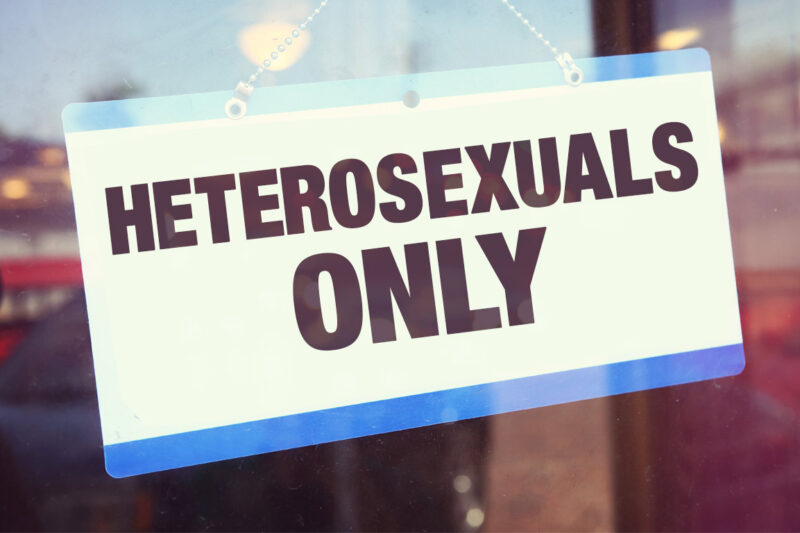President Trump and Attorney General Sessions Want to Enshrine a Business Right to Discriminate Into the Constitution


Can businesses put up a sign that says, “We Don’t Sell To Gays?” President Trump says yes.
Today Trump and Attorney General Jeff Sessions told the Supreme Court in an amicus brief that businesses have a constitutional right to discriminate against lesbian, gay, and bisexual people. That means that business owners could put a sign in the window saying, “We Don’t Serve Gays,” even if a state or Congress says anti-gay discrimination is unlawful.
While the Justice Department says this wouldn't necessarily allow businesses to turn people away because of their race, if the Constitution protects such a right to discriminate against gay people, it would also authorize businesses to discriminate based on national origin, sex, religion, disability, gender identity, or any other basis. That means businesses could put up other signs as well: “We Don’t Sell to Women.” “No Muslims.” “No Transgender People.” All in open defiance of the nation’s civil rights laws.
How did we get here?
The case before the Supreme Court has deceptively simple facts. Dave Mullins and Charlie Craig were planning their wedding reception in Colorado. Along with Charlie’s mom, Dave and Charlie went to the Masterpiece Cakeshop bakery near Denver to order a cake in July 2012. The bakery turned them away, saying it doesn’t make wedding cakes for gay couples because that would violate its religious beliefs and artistic freedom.
Everyone in this country should be opposed to such a radical ruling that would undermine America’s core commitment to equality.
Under long-standing Colorado law, businesses that are open to the public can’t turn customers away because they are lesbian, gay, or bisexual. That’s just what happened here, so Charlie and Dave sued. The Colorado courts agreed that it was discrimination and ruled that free speech and religious protections don’t give anyone a right to discriminate.
It’s easy to dismiss the case as trivial. Dave and Charlie could — and did — get a cake from another bakery. And few people would really want a cake from a bakery that doesn’t actually want to bake it.
But consider what a ruling for the bakery could mean here — constitutional protection for discrimination based on freedom of religion or expression. That’s breathtaking in its scope and consequences. It would mean that a florist could refuse to sell flowers for the funeral of an interfaith couple, a dance studio could turn away the children of an interracial couple, an architect could put up a sign saying, “No Jews,” a doctor could turn away transgender people altogether. And each and every law that makes discrimination illegal would be overridden by the constitutional right to discriminate.
In fact, the consequences go far beyond nondiscrimination laws.
If any business has a constitutional right to express its views or its religion by refusing to comply with a nondiscrimination law, it could defy other government rules as well. Businesses could refuse to follow food safety rules because they want to express themselves through their refusal. Or a company could flout consumer protection regulations because they are inconsistent with its religious beliefs.
This case has never been about the cake. It’s about whether anyone in America can be turned away from a business because of who they are. It’s about whether the Constitution gives businesses the right to discriminate whenever they want to.
Everyone in this country should be opposed to such a radical ruling that would undermine America’s core commitment to equality. That President Trump has endorsed a right to discriminate against LGBT people may not be surprising, given his earlier actions to in schools and to deprive lesbian, gay, and bisexual people of altogether. But it couldn’t be more un-American or shameful.

